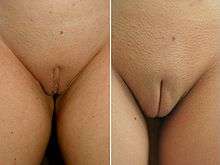Body modification

Body modification (or body alteration) is the deliberate altering of the human anatomy or human physical appearance.[1] It is often done for aesthetics, sexual enhancement, rites of passage, religious beliefs, to display group membership or affiliation, to create body art, for shock value, and as self-expression, among other reasons.[1][2] In its broadest definition it includes plastic surgery, socially acceptable decoration (e.g., common ear piercing in many societies), and religious rites of passage (e.g., circumcision in a number of cultures), as well as the modern primitive movement.
Explicit ornaments
- Body piercing - permanent placement of jewelry through an artificial fistula; sometimes further modified by stretching
- Ear piercing - the most common type of body modification
- Pearling - also known as genital beading
- Neck ring- multiple neck rings or spiral are worn to stretch the neck (in reality lowering of the shoulders)
- Scrotal implants[3]
- Tattooing - injection of a pigment under the skin
- Eyeball tattooing - injection of a pigment into the sclera
- Extraocular implant (eyeball jewelry) - the implantation of jewelry in the outer layer of the eye
- Surface piercing - a piercing where the entrance and exit holes are pierced through the same flat area of skin
- Microdermal implants[4][5]
- Transdermal implant - implantation of an object below the dermis, but which exits the skin at one or more points
Surgical augmentation
In contrast to the explicit ornaments, the following procedures are primarily not meant to be exposed per se, but rather function to augment another part of the body, like the skin in a subdermal implant.
- Breast implants - insertion of silicone bags filled with silicone gel or saline solution into the breasts to increase their size, or to restore a more normal appearance after surgery
- Silicone injection[6]
- Subdermal implant - implantation of an object that resides entirely below the dermis, including horn implants[7]
Removal or split
- Clitoral hood reduction - removal of the clitoral hood
- Clitoridectomy - removal of the clitoris
- Infibulation - removal of the external genitalia (and suturing of the vulva)
- Labiaplasty - alteration (removal, reduction, enhancement, or creation) of the labia
- Circumcision - the partial or full removal of the foreskin, sometimes also the frenulum
- Emasculation - complete removal of the penis (orchiectomy plus penectomy)
- Genital bisection - splitting of both the underside and the top of the penis, including genital inversion[8]
- Genital frenectomy[9]
- Headsplitting - splitting of both the underside and the top of the glans penis
- Meatotomy - splitting of the underside of the glans penis
- Orchiectomy - removal of the testicles
- Penectomy - removal of the penis
- Subincision - splitting of the underside of the penis, also called urethrotomy
Nipple cutting:
Nullification involves the voluntary removal of body parts. Body parts that are commonly removed by those practicing body nullification are: penis, testicles, clitoris, labia and nipples. Sometimes people who desire a nullification may be diagnosed with body integrity identity disorder or apotemnophilia.[12]
Tongue cutting:
- Lingual frenectomy[13]
- Tongue splitting - bisection of the tongue similar to a snake
Applying long-term force
Body modifications occurring as the end result of long term activities or practices
- Corsetry or tightlacing - binding of the waist and shaping of the torso
- Cranial binding - modification of the shape of infants' heads, now extremely rare
- Breast ironing - Pressing (sometimes with a heated object) the breasts of a pubescent female to prevent their growth.
- Foot binding - compression of the feet of girls to modify them for aesthetic reasons
- Anal stretching[14]
- Jelqing - penis enlargement
- Non-surgical elongation of organs by prolonged stretching using weights or spacing devices. Some cultural traditions prescribe for or encourage members of one sex (or both) to have one organ stretched till permanent re-dimensioning has occurred, such as:
- The 'giraffe-like' stretched necks (sometimes also other organs) of women among the Burmese Kayan tribe, the result of wearing brass coils around them. This compresses the collarbone and upper ribs but is not medically dangerous. It is a myth that removing the rings will cause the neck to 'flop'; Padaung women remove them regularly for cleaning etc.
- Stretched lip piercings - achieved by inserting ever larger plates, such as those made of clay used by some Amazonian tribes.
- Labia elongation
- Foreskin restoration
Others
- Branding - controlled burning or cauterizing of tissue to encourage intentional scarring
- Ear shaping[15] (which includes ear cropping,[16] ear pointing or "elfing"[17])
- Scarification - cutting or removal of dermis with the intent to encourage intentional scarring or keloiding
- Tooth filing[18] - generally used to have the appearance of some sort of animal.
- Yaeba - the deliberate misaligning or capping of teeth to give a crooked appearance. Popular in Japan.
-

Tattooed ankles
-

Ear piercing and stretching
-

Proto Nazca modified skull, c 200-100 BC
-

Breast augmentative surgery using fat grafts
-

Subdermal implant
-

Tongue splitting
-

Scarification
-

Teeth with Dental braces
-

Kayan woman with neck rings
-

Male genital tattooing
-

Clitoral hood reduction in adult caucasian female
Controversy
"Disfigurement" and "mutilation" (regardless of any appreciation this always applies objectively whenever a bodily function is gravely diminished or lost) are terms used by opponents of body modification to describe certain types of modifications, especially non-consensual ones. Those terms are used fairly uncontroversially to describe the victims of torture, who have endured damage to ears, eyes, feet, genitalia, hands, noses, teeth, and/or tongues, including amputation, burning, flagellation, piercing, skinning, and wheeling. "Genital mutilation" is also used somewhat more controversially to describe certain kinds of socially proscribed modifications to the genitals, such as male circumcision, female circumcision, castration, and surgeries performed to conform the genitals of individuals with intersex conditions to those of typical males or females.[19]
Many use body modification and self-mutilation interchangeably. In many ways self-mutilation is very different than body-modification. Body modification gives one the feeling of pride and excitement, giving one something to show off to others.[20] Alternately, those who self-mutilate typically are ashamed of what they've done and want to hide any evidence of harm. Body modification is explored for adornment, self expression, and an array of many other positive reasons, while self-mutilation is inflicted because of mental or emotional stress and the inability to cope with psychological pain. Those who self-mutilate do so in order to punish themselves, express internal turmoil, and reduce severe anxiety. [21]
Individuals known for extensive body modification
See also
- Adornment
- Apotemnophilia
- Attraction to disability
- Bioethics
- Blood ritual
- BME, a large website devoted to body modification
- BMEzine
- Church of Body Modification
- Deformity
- Eyeborg
- Fakir Musafar
- First haircut
- Genital modification
- Genital tattooing
- Leblouh
- Makeup
- Meatotomy
- Rhinoplasty
- Scarification
- Nonremovable adornment
- Suspension (body modification)
References
- 1 2 Thompson, Tim; Black, Sue (2010). Forensic Human Identification: An Introduction. CRC Press. pp. 379–398. ISBN 978-1420005714. Retrieved 2013-02-25.
- ↑ "What Is Body Modification?". Essortment. 16 May 1986. Retrieved 20 March 2015.
- ↑ "Scrotal Implant". Retrieved 20 March 2015.
- ↑ "Microdermal". Retrieved 20 March 2015.
- ↑ "Dermal Anchoring". Retrieved 20 March 2015.
- ↑ "Silicone Injection". Retrieved 20 March 2015.
- ↑ "Horn Implant". Retrieved 20 March 2015.
- ↑ "Inversion". Retrieved 20 March 2015.
- ↑ "Genital Frenectomy". Retrieved 20 March 2015.
- ↑ "Nipple Removal". Retrieved 20 March 2015.
- ↑ "Nipple Splitting". Retrieved 20 March 2015.
- ↑ Jamie Gadette. "Underground". Salt Lake City Weekly.
- ↑ "Tongue Frenectomy". Retrieved 20 March 2015.
- ↑ "Anal Stretching". Retrieved 20 March 2015.
- ↑ "Ear Shaping". Retrieved 20 March 2015.
- ↑ "Ear Cropping". Retrieved 20 March 2015.
- ↑ "Ear Pointing". Retrieved 20 March 2015.
- ↑ "Tooth Filing". Retrieved 20 March 2015.
- ↑ Wilchins, Riki. "A Girl's Right to Choose: Intersex Children and Parents Challenge Narrow Standards of Gender". NOW Times. National Organization for Women. Retrieved 12 September 2012.
- ↑ "Bradley University: Body Modification & Body Image". www.bradley.edu. Retrieved 2015-10-14.
- ↑ "Self-injury/cutting Causes - Mayo Clinic". www.mayoclinic.org. Retrieved 2015-10-14.
External links
- The Official Body Modification Organization
- Body Modification E-Zine Encyclopedia entry showing various inappropriate uses of ear piercing instruments
| ||||||||||||||||||||||||||||||||||
